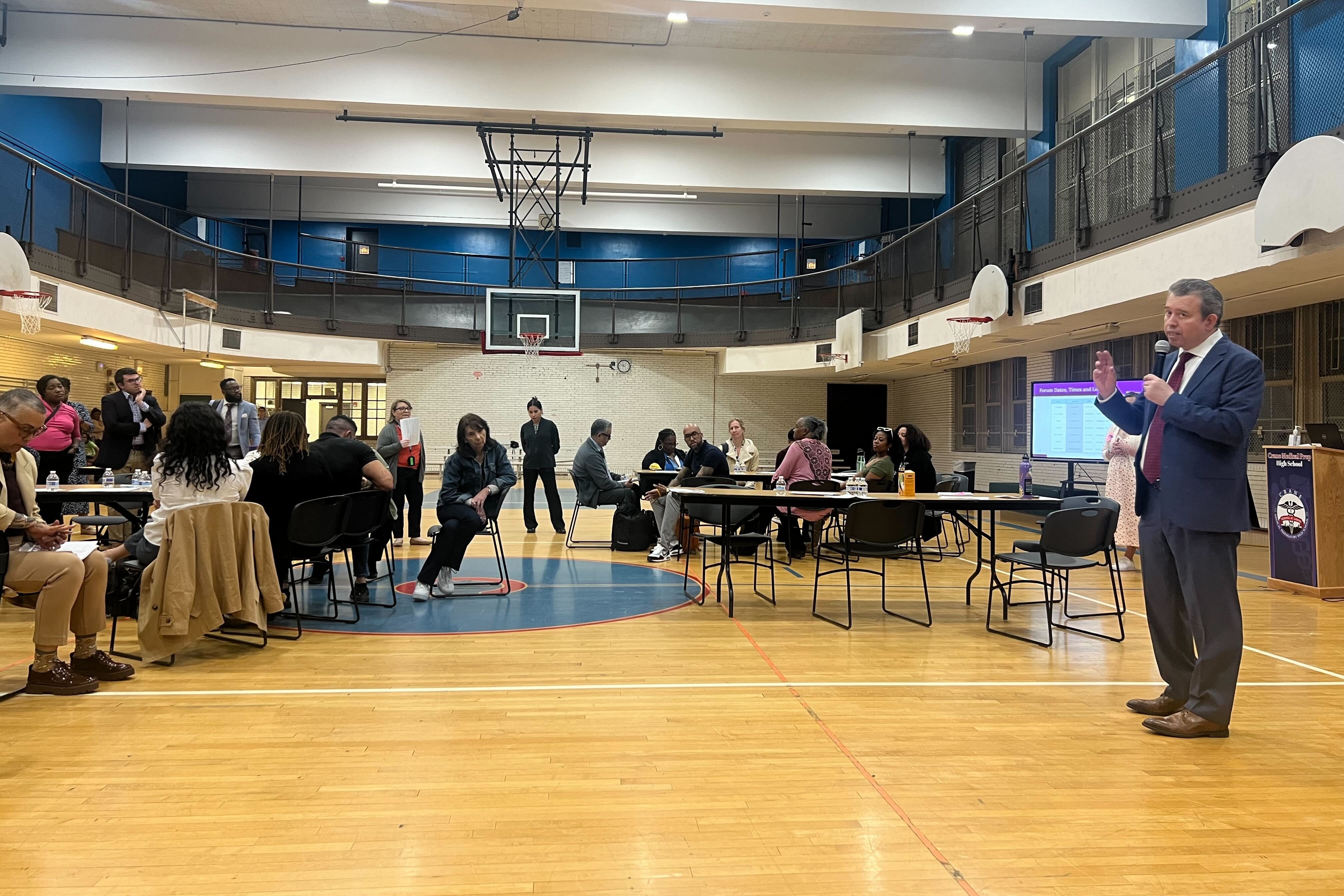Chicago Public Schools is mapping out its goals for the next five years and wants feedback from the public.
The plan — which will be finalized this summer — will focus on three priorities: how to improve students’ daily experiences in the classroom, staffing and funding, and collaborating more closely with school communities, CPS CEO Pedro Martinez told a crowd of about 40 people at Crane High School on Monday night for the first of seven community forums. Many of the attendees were district staff. Others were parents, community advocates, and representatives from outside organizations.
The plan gained some attention in the winter when the Chicago Board of Education announced it would move away from the school choice system. The board said it would outline a new approach in the strategic plan, and specific changes would depend on community feedback.
But school choice didn’t come up at Monday’s session. Martinez told Chalkbeat the district will ask families their opinions on school choice and capital planning in May, because those are “big topics.” The next three meetings this month will focus more on the daily school experience and funding, though parents also can share their thoughts about school choice, he said. Martinez said he’s already heard from Spanish-speaking parents who have struggled to navigate the GoCPS system.
As Martinez went over the district’s priorities, he highlighted some successes, including a recent growth in reading and math.
“We are building a five-year plan so this continues, and we continue to accelerate,” Martinez told the crowd.
Martinez, who was hired in 2021, established a three-year blueprint in the fall of 2022. The district is developing the next five-year strategic plan at a moment of big change.
Chicago is holding its first school board elections this fall and candidates are starting to emerge. In January 2025, a hybrid board with 10 elected members and 11 members appointed by the mayor will be sworn into office.
Since taking office a year ago, Mayor Brandon Johnson’s appointed school board has voted to remove police officers from schools in addition to passing the resolution to shift away from school choice. Both moves prompted a response from state lawmakers who are debating bills that could prevent those changes.
District officials have also rolled out a new budgeting formula that provides set staffing levels to all schools and additional discretionary spending based on need. They’ve also cut bus service for general education students and struggled to comply with providing transportation to students with disabilities who are legally entitled to it.
Martinez and other district officials spent the first hour of Monday’s meeting talking about the vision for the district over the past few years, as well as the feedback officials have collected so far through other community meetings and focus groups, such as on how to ensure the success of Black students. So far, that feedback has run the gamut, Martinez said, including asking the district to better prepare students for life after high school, focus more on supporting students’ mental health, provide more funding for building repairs and transportation, and include families in decision making.
In the second hour, attendees rotated between three tables. At each, CPS staff talked about their work — such as changing the funding formula for school budgets or their desire to expand dual language programming — and then took questions from members of the community.
At one table, which focused in part on funding, most of the roughly 15 people seated were CPS staff. One of the few community members was Catherine Jones, a longtime education advocate on the West Side who asked if the district was still considering enrollment under its new funding formula. Budget Director Mike Sitkowski told Jones that the new formula would “guarantee that even the smallest school has a baseline” of staff.
“Which is good,” Jones responded.
At another table, parent Alexandra Beltrand, a mother of three CPS kids, asked if the district could expand dual language programs.
By 8 p.m. — the scheduled end of the meeting — attendees had only rotated tables twice, and attendees at at least two of the tables had just a few minutes to ask questions after hearing from CPS staff. Attendees were encouraged to write down their questions and feedback so that staff could review and record it later.
“We’re going to see what worked today, what didn’t — so for example, we didn’t have as much time to have more rotations,” Martinez said. “We’re even wondering, do we start having even more groupings instead of three?”
Still, Beltrand said the meeting was helpful. After the meeting ended, she chatted one-on-one with staff from the district’s Office of Cultural and Language Education.
“I felt heard,” Beltrand said.
People interested in attending the meetings can register online here.
Becky Vevea contributed.
Reema Amin is a reporter covering Chicago Public Schools. Contact Reema at ramin@chalkbeat.org.





